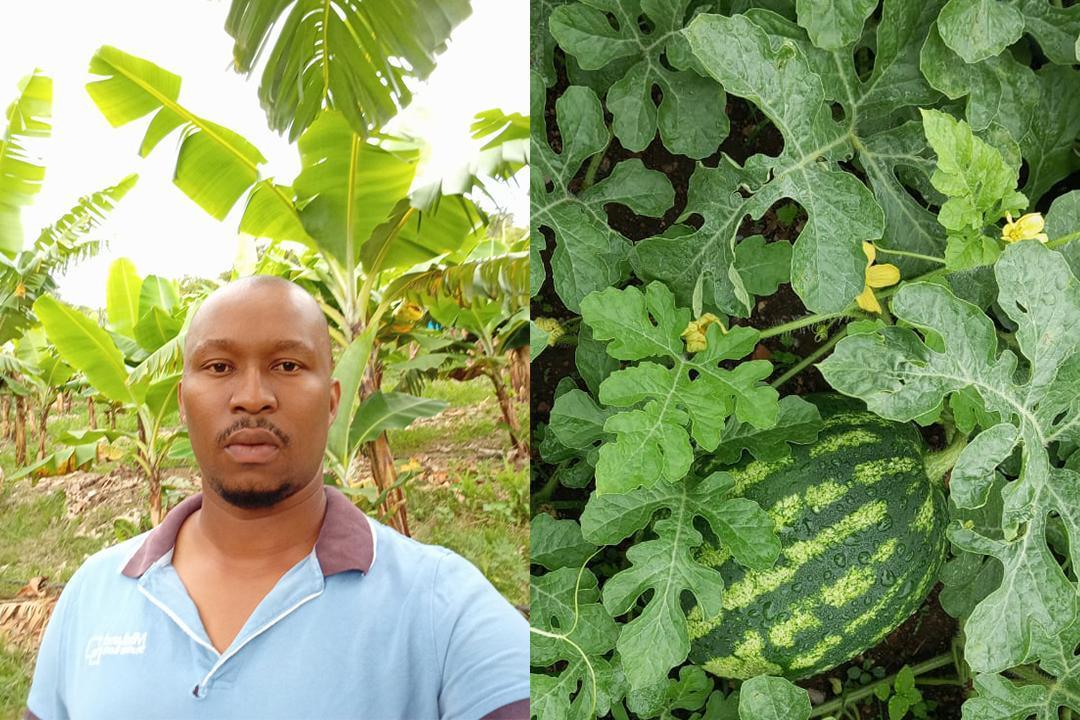Africa-Press – Eswatini. Commercial farming is not for the faint hearted and no one knows that better than Phinda Khumalo, who rose from village fields in Gebeni to manage certified farms and train over 500 growers across the country.
For Phinda, farming is more than just work , it’s a calling deeply rooted in his upbringing. Raised in a farming family, he learned the basics of agriculture early in life. “Growing up in a farming family helped me a lot because some of the basics, like when and how to plant, I had already mastered from a young age,” he says. “Seeing the income agriculture could bring made me fall in love with it even more.”
He later pursued formal training in Horticulture at the University of Eswatini , graduating in 2017. Phinda firmly believes academic training in agriculture is crucial for commercial success. “It helped me gain knowledge and exposure to different farming methods, which are important if you want to achieve quality produce,” he explains. “It equipped me with the understanding needed to thrive in today’s agricultural space.”
Before completing his studies, Phinda interned at Luyengo Farm Produce in 2016, an experience that marked a major turning point. “I was favoured by God to meet the Farm Director, who was passionate about me and taught me a lot,” he recalls. Through this mentorship, he learned vital practices such as proper land preparation, timely fertiliser application, correct spraying techniques, and most importantly, record keeping and conducting market research before planting. “That internship empowered me with deep knowledge of commercial farming,” he adds.
Remarkably, Phinda began commercial farming in 2015, a year before his internship. What started as a small entrepreneurship project has grown into a well rounded career spanning over seven years and three farms: Luyengo Farm Produce, Ufalme, and Project Canaan.
At Ufalme, Phinda trained more than 500 farmers in Good Agricultural Practices (GAP), helping to strengthen the foundation of agriculture across communities. He also coordinated the collection of produce from various farmers to supply major outlets such as Pick n Pay, Spar, and local vendors. As a farm manager at Ufalme’s Sphocosini site, he led production of crops including cabbage, sukuma wiki, butternut, spinach, and lettuce.
His next chapter unfolded at Project Canaan, where he served as farm supervisor. There, he managed orchards, nurseries, greenhouses, and field crops spanning approximately 15 to 20 hectares. “Project Canaan is Global GAP certified, which means the standard is world recognised,” he says. This role gave him insight into managing farms that meet international quality benchmarks.
But even with years of experience, Phinda admits commercial farming is a demanding space. “Coming from a farming family doesn’t guarantee that you’ll manage crops and people easily,” he says. “One of the biggest challenges was managing people. At first, it was tough because people have different characters, but over time I learned how they think and operate, and I conquered that challenge.”
He also faced the pressure of managing large farms and ensuring all crops met market standards while remaining profitable. “Everything must be done in time, and the quality must be high,” he explains. “It wasn’t easy at first, but I learned bit by bit until I became the best at it.”
Phinda carries with him valuable advice from a Luyengo Farm Director: “A degree is like an empty cup , it’s upon you to fill it up with on ground knowledge,” and “If you haven’t farmed for 20 years, you haven’t yet done farming.” These words continue to shape his work ethic and vision.
He also values adaptability. “Keeping yourself up to date with what the market wants, doing trials under different conditions, and working in various parts of the country has sharpened me,” he says. He believes that blending traditional and modern farming methods is key. “If you want to do great, you have to use both. Our soils still need animal manure, and traditional seed selection is still valid today. At the same time, modern spraying techniques are essential. Both methods work hand in hand.”
Looking ahead, Phinda dreams of owning his own fully operational farm focusing on nurseries, orchards, and protected farming through greenhouses or lath houses. While he already has land, he is actively seeking start up capital and access to water and working materials. “That’s my biggest challenge right now,” he says, “but I’m exploring different platforms to help bring that dream to life.”
Through determination, faith, and years of hard earned experience, Phinda Khumalo continues to sow knowledge and harvest impact not only for himself, but for the future of farming in Eswatini.
For More News And Analysis About Eswatini Follow Africa-Press







